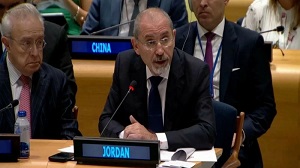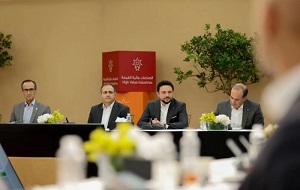EMV mining workshop highlights Kingdom’s drive to unlock mineral potential, attract investment
The Jordan Times
AMMAN — The Economic Modernisation Vision (EMV) workshops continued Sunday at the Royal Hashemite Court with a dedicated session on Jordan’s mining sector, underscoring its strategic role in boosting industrial growth, export diversification, and regional development.
Bringing together policymakers, investors, and sector experts, the session assessed progress under the EMV’s first phase while charting future directions to unlock the full potential of the Kingdom’s mineral wealth.
Officials and participants highlighted Jordan’s rich reserves of phosphates, potash, bromine, copper, and rare earth elements, calling them a cornerstone of the country’s industrial base.
Jordan ranks seventh globally in phosphate reserves and remains one of the world's top producers of both potash and phosphate. These assets, they said, offer strong potential for attracting foreign direct investment, expanding downstream industries, and enhancing value-added exports in chemicals, fertilisers and metals.
The mining sector currently contributes around 8 per cent of Jordan’s GDP and accounts for more than 20 per cent of national exports. Companies such as Arab Potash Company (APC) and Jordan Phosphate Mines Company (JPMC) have played pivotal roles in positioning Jordan as a major regional exporter.
Stakeholders noted that productivity in the sector remains high, with mining jobs ranking second in GDP contribution per employee after financial services. However, they stressed the need to improve geological surveying, update regulatory frameworks, and streamline licensing procedures to encourage sustainable expansion.
The sector’s goals under the EMV include boosting employment, especially in mining governorates, improving the investment climate, expanding industrial mining beyond phosphates and potash, and promoting environmentally responsible practices. Plans are also underway to establish an independent geological survey authority and improve data transparency to international standards.
Among the key achievements in the first phase were the launch of an online platform showcasing investment opportunities in minerals such as basalt, silica, gypsum, kaolin, dolomite, and feldspar. Additionally, a new regulation was issued in 2020 to govern strategic resource projects, including oil shale, coal, and critical minerals.
Participants also emphasised the importance of aligning mining policies with international environmental standards and integrating renewable energy to lower production costs and emissions, thereby strengthening the sector’s international competitiveness.
As Jordan advances into the next phase of the EMV, the mining sector is poised to become a key driver of industrialisation and sustainable economic development, leveraging both existing strengths and untapped mineral potential.
CEO of the Arab Potash Company (APC) Maen Nsour, in an interview with The Jordan Times, reiterated the company's role as one of the “locomotives of the Jordanian economy”, outlining its alignment with the EMV through major investments in production expansion, sustainability and high-value exports.
“We have worked very hard during the past three years to achieve the objectives of the economic vision,” Nsour said, stressing the company’s focus on attracting foreign direct investment combined with advanced technologies.
A key example, he noted, is the expansion of the Jordan Bromine Company, a joint venture with the American company Albemarle, with a new $813 million investment. “When we finish this expansion, Jordan will become the largest producer and exporter of bromine and tetrabromine,” he said, highlighting the strategic importance of these commodities across international industries.
Nsour also highlighted a $1.1 billion expansion project aimed at increasing potash production by 750,000 tonnes annually. Upon completion, Jordan’s total output would reach around 4 million tonnes per year. “These quantities will be exported to markets in Europe, Brazil, China, India and across the Arab world, and also used in high-value-added industries such as fertilisers and chemicals,” he added.
On sustainability, Nsour stressed the centrality of environmental responsibility to APC’s strategy. “We want to maintain an industry that is compatible with the environment and serves the best interests of future generations in Jordan,” he said. He also noted that meeting international sustainability standards, particularly the EU’s carbon border adjustment requirements, is essential to maintaining and growing Jordan’s presence in key export markets. “You cannot do that unless sustainability and environmental aspects are very well taken into account,” he said.
Jordan Bromine Company (JBC) General Manager Samer Asfour underlined the mining industry's role in job creation and value-added exports. He told The Jordan Times that the company currently employs around 640 Jordanians and is moving ahead with expansion plans expected to boost that number to over 1,000.
“We’re definitely bringing foreign currency into the country, addressing unemployment challenges, and playing a major role in the national GDP and total exports,” he said.
Asfour also stressed that innovation and technological advancement are central to the company’s competitiveness in global markets. “Our expansion projects are part of a continuous effort to enhance efficiency, increase revenues, and improve the sophistication of our products,” he noted, adding that this aligns closely with the EMV's goals for industrial innovation and export growth.
He also pointed to the company’s existing international partnerships as a model for sector development. “JBC is already a successful joint venture between the Arab Potash Company and the largest bromine company in the world. Our ongoing investments reflect our commitment to the local economy and the broader objectives of the EMV.”
Arab National Mining Company CEO Ayman Ayash highlighted the company's alignment with the EMV, noting that it was launched as a private sector initiative aimed at unlocking the full potential of Jordan’s mineral resources
“The company came as an initiative from the private sector to implement His Majesty King Abdullah's vision for the mining sector,” Ayash. He explained that the firm was founded by prominent Jordanian and regional businessmen to reinforce the strategic partnership between the government and private sector in advancing the mining industry.
Ayash stressed that real progress in the mining sector requires foundational reforms across five key areas. He called for the establishment of an independent geological survey authority, describing it as a necessary “incubator” for the sector. “This would serve as the backbone for reliable data and resource planning,” he said.
Ayash also emphasised the importance of administratively separating the mining and energy sectors, stressing that they are fundamentally distinct industries. “As long as we continue to operate under a unified Ministry of Energy and Mineral Resources, mining will remain a secondary priority and receive limited attention,” he said.
The third priority, he said, is to overhaul existing laws and regulations to align with international best practices and make Jordan more competitive in attracting international investors. “We must revamp the laws so they are at least equal to those in neighbouring countries,” he said.
Ayash also emphasised the importance of establishing a comprehensive mining databank. "This would consolidate geological, geochemical and geophysical data, including borehole samples and historical exploration reports, to provide a solid foundation for future investment and exploration.
He also underscored the need for comprehensive financial reforms, calling for the introduction of a more competitive fiscal system and a government-backed exploration enablement program. “We need a tradable stock exchange platform dedicated to junior mining companies,” he added. “These companies are the driving force behind international exploration efforts, and they must have reliable access to financing to carry out their work effectively.”
Latest News
-
 Huge quake off Russia sparks Pacific tsunami warnings
Huge quake off Russia sparks Pacific tsunami warnings
-
 Safadi says recognition of Palestinian State ‘urgent necessity’, prerequisite to achieving lasting peace
Safadi says recognition of Palestinian State ‘urgent necessity’, prerequisite to achieving lasting peace
-
 Trump says Gaza ceasefire 'possible' amid Starmer talks
Trump says Gaza ceasefire 'possible' amid Starmer talks
-
 Crown Prince attends ICT session within economic vision’s second phase workshops
Crown Prince attends ICT session within economic vision’s second phase workshops
-
 Jordan carries out two more Gaza aid airdrops, with UAE participation
Jordan carries out two more Gaza aid airdrops, with UAE participation